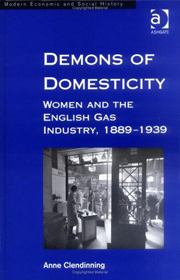
Demons and Domesticity:
Women and the English Gas Industry, 1889-1939
Anne Clendinning
Demons of Domesticity offers a social history of the English gas industry from the 1880s to the late 1930s, with an emphasis on the corporations that served London and the Home Counties. It documents the hitherto unexamined role that women played in the development of the industry by considering two major interlocking themes: the expansion of sales occupations for women in the English gas industry, and the parallel growth and diversification of the industry's marketing strategies. During the late-nineteenth century, the home became the focal point for a number of debates concerning female employment and gender roles. As an increasing number of labour saving domestic devices came onto the market women found themselves targeted by manufacturing companies and utility suppliers, both as consumers and advocates. Foremost among these companies were representatives of the gas industry who actively addressed domestic issues. As the promoters, purveyors and consumers of domestic technology, Demons of Domesticity suggests that English female employees and consumers were not the hapless dupes of corporate marketing, but instead had clear ideas about how domestic technology could and should be used to reconfigure the public and private spaces of work and home.
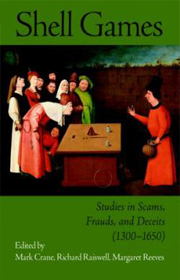
Shell Games:
Studies in Scams, Frauds, and Deceits
(1300-1650)
Edited by Mark Crane, Richard Raiswell, and Margaret Reeves.
As Michel de Montaigne pointed out, truth's opposite has a hundred thousand shapes and a limitless field. The papers in this volume are thirteen examples of these hundred thousand shapes and serve as case studies in a potentially limitless field. Treating of instances from Italy, Spain, England, France, and the Empire, they are concerned with parochial and patriarchal networks of power. They deal with people on the margins of society, pushing and trying to manipulate boundaries; they deal with people at the very centre of power, endeavouring to conserve or enhance their position. They deal with the strong using lies to oppress the weak and the weak using lies as counter discourses. But at their heart, all of the papers in this collection raise crucial questions about the nature of truth as well as its construction and detection for pre-modern men and women. The perpetrators of these scams, their victims, and the authorities charged with policing them, all grapple with fundamental problems of the role of authority, power, status, gender, tradition, orality, and technology as they craft their schemes or plot their courses of action. In short, they highlight sites of social, political, and epistemological tension as Europe slowly moves from the medieval to the modern.
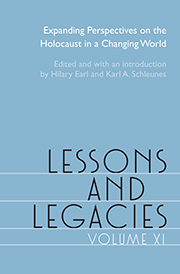
The Nuremberg SS-Einsatzgruppen Trial, 1945-1958:
Atrocity, Law, and History
Hilary Earl
Based on extensive archival research, this book offers the first historical examination of the arrest, trial, and punishment of the leaders of the SS-Einsatzgruppen – the mobile security and killing units employed by the Nazis in their racial war on the eastern front. Sent to the Soviet Union in the summer of 1941, four units of Einsatzgruppen along with reinforcements, murdered approximately one million Soviet civilians in open air shootings and in gas vans and, in 1947, twenty-four leaders of these units were indicted for crimes against humanity and war crimes for their part in the murders. In addition to a describing the legal proceedings, this book also examines recent historiographical trends and perpetrator paradigms and expounds on such contested issues as the timing and genesis of the Final Solution, the perpetrators' route to crime and their motivation for killing.
Prize Winner
2010 Hans Rosenberg Book Prize, Conference Group for Central European History
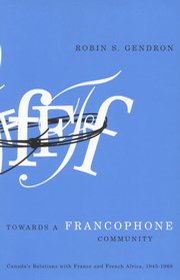
Towards a Francophone Community:
Canada's Relations with France and French Africa, 1945-1968
Robin S. Gendron
Between 1968 and 1971, Quebec almost succeeded in becoming the sole representative of French Canadians within la Francophonie - the international community of French-speaking states. Robin Gendron examines relations between Canada and French Africa from 1945 to 1968 within the context of Canada's deteriorating relations with France and Quebec's aggressive pursuit of its own international interests in the 1960s. Using extensive archival research, Gendron rebuts the argument of Quebec nationalists and scholars that the Canadian government's neglect of French Africa forced Quebec to develop its own international identity. "Towards a Francophone Community" shows that there had been active federal interest in French African affairs since the late 1940s, within the context of developments in NATO and the Cold War, the vagaries of Canada's relations with France, and the Quiet Revolution in Quebec. Gendron argues that the subordination of Canadian interests in French Africa to other foreign policy concerns during the 1950s and early 1960s ultimately weakened Canada's ability to prevent Quebec from participating in la Francophonie.
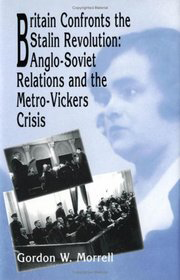
Britain Confronts the Stalin Revolution:
Anglo-Soviet Relations and the Metro-Vickers's Crisis
Gordon W. Morrell
In March 1933 the economic section of the Soviet secret police arrested six British engineers employed by the Metropolitan Vickers Electrical Company. The arrests provoked a confrontation that brought Anglo-Soviet relations to the brink of disaster and resurrected the spectre of the show trials and purges of the technical intelligentsia that had shaken Soviet society from 1928 to 1931. Britain Confronts the Stalin Revolution is the first full-length study of the Metro-Vickers’ show trial of 1933. Based upon some new and many underutilized Soviet and British sources, Gordon Morrell examines the political, economic, social, legal and cultural dimensions of the only Stalinist political trial of the 1930s that directly engaged a foreign power. Morrell explores the roots of the crisis by analyzing Metro-Vickers’ role in the electrification of the USSR and he examines the political, economic and diplomatic relations between Britain and the Soviets that gave the crisis its international importance. He focuses on the efforts of the British Government to understand and respond to the new Stalinist order and, importantly, casts new light on the apparent role of the British Industrial Intelligence Centre during the early 1930s. Britain Confronts the Stalin Revolution is an accessible, original and multidimensional work that makes an important contribution to the study of Anglo-Soviet relations.
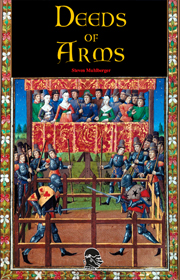
Deeds of Arms:
Formal Combats in the Late Fourteenth Century
Steven Muhlberger
Medieval deeds or arms evoke the imagination as brightly armoured knights clash with a splintering of lances. During the fourteenth century, the reality of the deeds of arms was focused not only on the noble jousting festivals and round tables. They were sometimes fought by men-at-arms who risked their lives for the fame and renown brought. Encounters such as the Combat of the Thirty and the Jousts at Saint Ingelvert, well described in multiple surviving sources, were the superbowls of chivalric life during the Hundred Years War and have been leveraged by Professor Muhlberger in his successful quest to bring these men of renown to life.
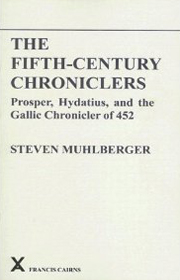
The Fifth-Century Chroniclers:
Prosper, Hydatius, and the Gallic Chronicler Of 452
Steven Muhlberger
The fifth century AD has always been a period of intense interest for historians. At the beginning, the Roman Empire looked as impenetrable as it had done for centuries, but by 500AD the world had changed beyond recognition. The western emperor had been deposed and the imperial government had lost control of most of Europe. From now on, inhabitants of western Europe lived in a post-Roman world. The writers of Latin histories in the fifth century were not concerned with the minutiae of politics, or military affairs, they were Christians who saw the development of the world purely as God's plan for humanity. The connection between present and past was best shown through the new type of historical work, the Christian chronicle, the narrative structure of which was based around extensive lists, with minimal written detail. The three chroniclers whose work is discussed here were amongst the earliest to take up this new literary form, and each wrote a continuation of Jerome's chronicle, itself a translation of Eusebius' Christian world chronicle. xii + 329 pages (Francis Cairns, ARCA 27, 1990, Paperback edition 2006).
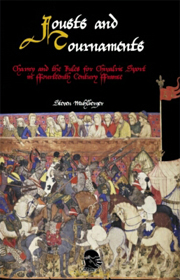
Jousts and Tournaments:
Charny and the Rules for Chivalric Sport in Fourteenth-Century France
Steven Muhlberger
Muhlberger adds a significant new work to the understanding of the "tournament' of the 14th century with this groundbreaking work. Drawing extensively and with great expertise from the historical record, and featuring the first translation of the 14th century "Demands Pour La Joute, La Tournois et La Guerre," by Sir Geoffroi de Charny, Muhlberger has created a crystal clear picture of what the sweat, blood, and competition of the mounted tournament was all about.
Creating a Modern Countryside:
Liberalism and Land Resettlement in British Columbia
James Murton
In the early 1900s, British Columbia embarked on a brief but intense effort to manufacture a modern countryside. The government wished to reward veterans of the Great War with new lives: soldiers and other settlers would benefit from living in a rural community, considered a more healthy and moral alternative to urban life. But the fundamental reason for the land resettlement project was the rise of progressive or "new liberal" thinking, as reformers advocated an expanded role for the state in guaranteeing the prosperity and economic security of its citizens. This ideological shift pushed the government to intervene directly in the management of not only society but also the natural environment. As most arable, accessible land in British Columbia was already being farmed by 1919, the state had to undertake environmental engineering projects on a scale not yet attempted in the province. Creating a Modern Countryside examines how this process unfolded, identifies its successes and failures, and demonstrates how the human-environment relationship of the early twentieth century shaped the province we live in today.
Prize Winner
K.D. Srivastava Prize for Excellence in Scholarly Publishing
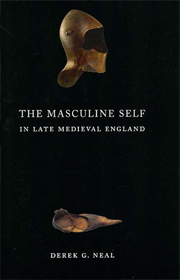
The Masculine Self in Late Medieval England
Derek G. Neal
What did it mean to be a man in medieval England? Marshalling a wide array of colourful evidence—including legal records, letters, medical sources, and the literature of the period—Derek G. Neal plumbs the social and cultural significance of masculinity during the generations born between the Black Death and the Protestant Reformation. He discovers that social relations between men, founded on the ideals of honesty and self-restraint, were at least as important as their domination and control of women in defining their identities. By carefully exploring the social, physical, and psychological aspects of masculinity, The Masculine Self offers a uniquely comprehensive account of the exterior and interior lives of medieval men.
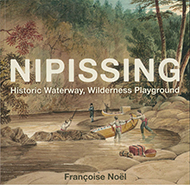
Nipissing: Historic Waterway, Wilderness Playground
Françoise Noël
Explore the history of tourism in the Nipissing Passageway, from Mattawa to Georgian Bay, beginning with Champlain's voyage in 1615. In the nineteenth century, while the hope of building a Georgian Bay Ship Canal remained elusive, promotional efforts were made by the railways to market the area as a "sportsman's paradise." In the early twentieth century, Ontario began to build roads to lure American motorists to the area. In Nipissing, Françoise Noël demonstrates how these efforts led to the early appearance of cottagers in the French River area and the rise of local outfitters. Places of interest include Quintland, named for the famed Dionne Quintuplets, which was seen as a pilgrimage site and saw resort expansion through the post-war recovery. A look at the Nipissing area today reveals that, for many, it remains a wilderness playground.
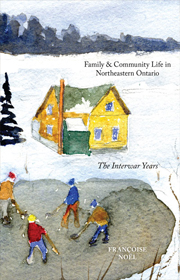
Family and Community Life in Northeastern Ontario:
The Interwar Years
Françoise Noël
Françoise Noël explores the social context of Canada's most famous family to show how family ritual and communal events structured everyday life between the wars. An extensive series of interviews with local residents and a reconstruction of local news and events as chronicled in The Nugget newspaper, among other sources, allow Noël to bring to life the daily routines and celebrations that were a part of family life in rural and urban settings from Mattawa to North Bay. Family life was not lived in isolation, and she also reveals the rich community life that developed in shared social spaces like schools and churches, and through community groups. What people did for fun may have been frivolous but it was not trivial: accounts of shared leisure activities, popular sports, and community festivals such as Old Home Week provide important insights into the structure and value of community life.
Prize Winner
Fred Landon Award, Ontario Historical Society (2009)
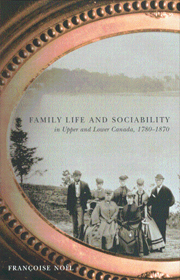
Family Life and Sociability in Upper and Lower Canada, 1780-1870:
A View from Diaries and Family Correspondence
Françoise Noël
Drawing on diaries and letters exchanged between family members Françoise Noël considers the nature of family, the couple during courtship and after marriage, parents and children in childhood and after the children leave home, and the social life of the family in terms of both leisure time and entertainment and the mutual assistance provided by social networks of kin, neighbours, and friends. She notes that courtship usually took place within the social network of interactions with kin and neighbours and shows that family life was located in a broad social space that included people of various ages. By examining the correspondence and diaries of francophone and anglophone middle-class families of various faiths, Noël presents touching stories of family life in the Canadas in the early nineteenth century.
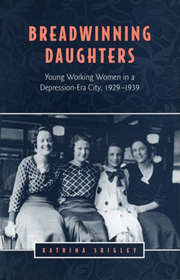
Breadwinning Daughters:
Young Working Women in a Depression Era City, 1929-1939
Katrina Srigley
Srigley argues that young women were central to the labour market and family economies of Depression-era Toronto. Oral histories give voice to women from a range of cultural and economic backgrounds, and challenge readers to consider how factors such as race, gender, class, and marital status shaped women's lives and influenced their job options, family arrangements, and leisure activities. Breadwinning Daughters brings to light previously forgotten and unstudied experiences and illustrates how women found various ways to negotiate the burdens and joys of the 1930s. As one of the most difficult periods of the twentieth century, the Great Depression left few Canadians untouched. Using more than eighty interviews with women who lived and worked in Toronto in the 1930s, Breadwinning Daughters examines the consequences of these years for women in their homes and workplaces, and in the city's court rooms and dance halls.
Nominated
Heritage Toronto Awards (2011)
Award Winner
Alison Prentice Award in Women's History (2012)
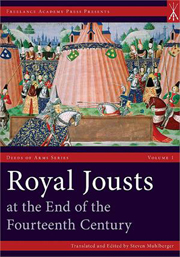
Royal Jousts at the end of the Fourteenth Century
Steven Muhlberger
Few images of chivalry are stronger in the popular mind than that of two armoured knights in a joust, crashing together astride their chargers. Yet, considering the importance of formal combat to the medieval aristocracy, we possess surprisingly few detailed accounts of tournaments, jousts or duels. As the great sporting event of its day, fans of feats of arms enjoyed hearing about them, but extensive descriptions of the actual events involving contemporary warriors were not what they were looking for. Sometimes, however, there was an upswing of interest that inspired poets and chroniclers to write more detailed descriptions of both combats and accompanying celebrations. One particularly rich time for source material are the years 1389-90, when diplomatic competition between Charles VI of France and Richard II of England inspired the kings to sponsor some of the most spectacular formal combats of the entire Middle Ages. These feats of arms attracted a great deal of attention from contemporary writers and they were not soon forgotten. As a result, we have valuable descriptions of how jousting was performed and appreciated at the highest social levels in the two great rival kingdoms of the West. Bringing together some of the most important accounts of medieval jousting,especially those of the jousts at St. Inglevert, Royal Jousts is a direct look at the sources that have influenced our modern notion, and every modern reconstruction, of late medieval jousting. It is also the first entry in our new Deeds of Arms series a series of short, color-illustrated readers that make primary source accounts of famous displays of martial and chivalric prowess of the High and Late Middle Ages and early Renaissance accessible to a broad audience.
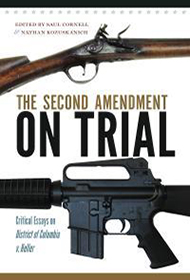
The Second Amendment On Trial
Edited by Saul Cornell and Nathan Kozuskanich
On the final day of its 2008 term, a sharply divided U.S. Supreme Court issued a 5-to-4 decision striking down the District of Columbia’s stringent gun control laws as a violation of the Second Amendment. Reversing almost seventy years of settled precedent, the high court reinterpreted the meaning of the “right of the people to keep and bear arms” to affirm an individual right to own a gun in the home for purposes of self-defence. The landmark ruling not only opened a new chapter in the contentious history of gun rights and gun control but also revealed both the strengths and problems of originalist constitutional theory and jurisprudence. This volume brings together some of the best scholarship on the Heller case, with essays by legal scholars and historians representing a range of ideological viewpoints and applying different interpretive frameworks. Following the editors’ introduction, which describes the issues involved and the arguments on each side, the essays are organized into four sections. The first includes two of the most important historical briefs filed in the case, while the second offers different views of the role of originalist theory. Section three presents opposing interpretations of the ruling and its relationship to modern constitutional doctrine. The final section explores historical research post-Heller, including new findings on patterns of gun ownership in colonial and Revolutionary America.
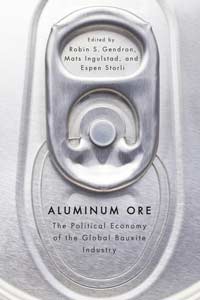
Aluminum Ore
Edited by Robin Gendron, Mats Inqulstad, and Espen Storli
As the key component in aluminum production, bauxite became one of the most important minerals of the last one hundred years. But around the world its effects on people and economies varied broadly -- for some it meant jobs, progress, or a political advantage over rival nations, but for many others, it meant exploitation, pollution, or the destruction of a way of life. Aluminum Ore explores the often overlooked history of bauxite in the twentieth century, and in doing so examines the social, political, and economic forces that shaped the time. Its development became a strategic industry during the First World War, and then the subject of international struggle for dominance during the Second World War. Yet in post-war years it was globalization, not military conquest, that expanded global value chains. The extraction of bauxite -- a mineral found mostly in the developing world -- was made profitable by the growth of multinational corporations and the spread of globalization, leaving behind a troubled cultural and environmental legacy. In this wide-ranging collection, scholars from around the world consider multiple perspectives on this history -- from Guinea to Nazi Germany to Jamaica -- all while examining the central place of one commodity in a time of change.
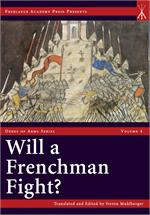
Will a Frenchman Fight?
Steven Muhlberger
Will a Frenchman Fight? describes a campaign of the Hundred Years War in 1380–1 in which a variety of different kinds of combat and different motives for fighting are evident. The campaign itself was a great chevauchée, or raid, by the English through France and though it had its practical goals, it was also a striking illustration of the place of chivalric self- image in shaping warfare. The English hoped to weaken their opponents by demonstrating that the French king, Charles V, could not defend his subjects. The French king had practical reasons for wishing to avoid spectacular but dangerous set battles similar to Crecy and Poitiers—battles that had been catastrophic for the French. Avoiding battle, however, had its price. If enough people in France concluded that the English were right in their scorn for royal power, that power would be significantly reduced. In the fourth volume of the Deeds of Arms series, Muhlberger demonstrates that although Charles V's strategy for avoiding battle was prudent, it was unpopular, showing how considerations of war, peace and personal honour were tightly bound together, and that direct confrontation of man against man or army against army was the most satisfying way of settling such issues. Color illustrations, maps, and a comprehensive bibliography complement this fascinating text.
